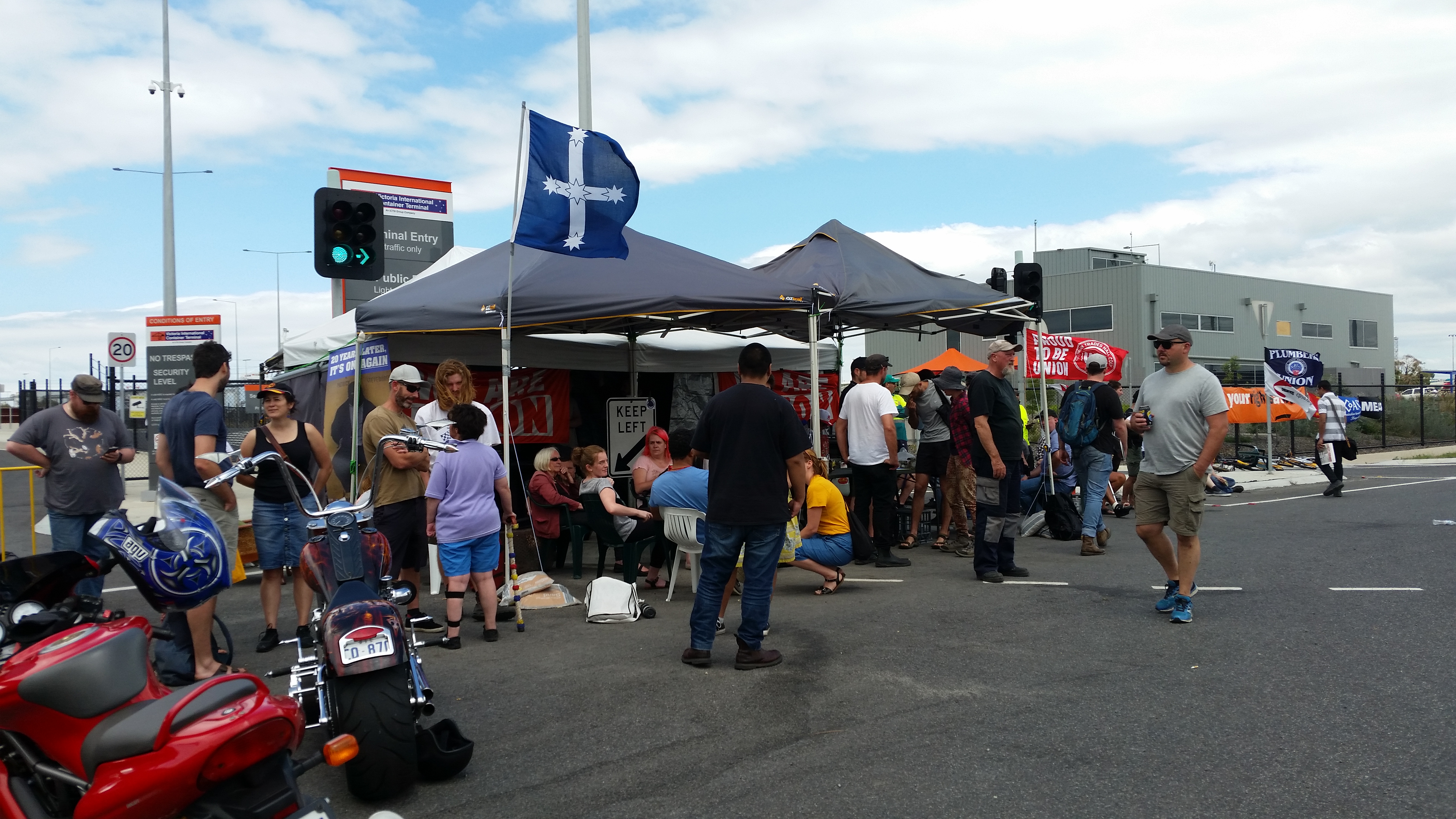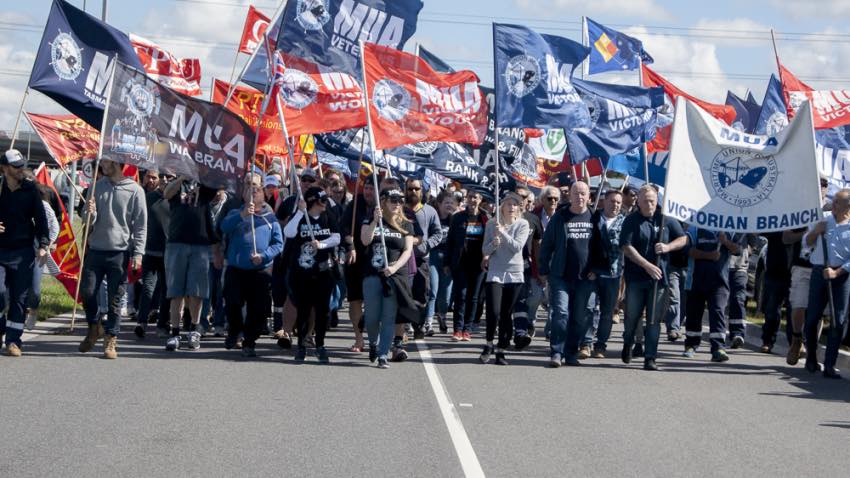Maritime workers defy bosses' intimidation
Written by: on
The Maritime Workers Union Webb Dock struggle has shown that collective struggle on the ground is a very powerful tool of the working class and the basis of an independent working class agenda.
“We’ll be here as long as it takes”, declared a quietly spoken union rank file member, settling into a threadbare orange plastic chair that has seen better days on many picket lines.
For two weeks, through searing heat and drenching rain, maritime workers and their supporters from other unions and the wider community kept a 24 hour vigil outside the two gates of Victoria International Container Terminals (VICT) at Webb Dock, in the Port of Melbourne.
For two weeks no truck drove in or out of the gates. No wharfie passed through the gates. And with every passing day the confidence, tenacity and determination of workers and community supporters on the picket line and in the wider union movement grew in strength and numbers.
New visitors to the picket line heard and learned about the union busting company VICT and its Philippines-based parent company ICTSI (International Container Terminal Services Inc.); its notoriously atrocious global practices of mistreating workers, crushing wages and conditions and trampling over unions in the countries they operate. The hard fought for pay and conditions won by Australian wharfies through long and hard struggle were on the chopping block again.
New arrivals to the picket learned from first-hand experience about the oppressive fascist-like laws of the state that criminalise and make illegal collective action by unions and workers fighting to protect and improve the pay and conditions and living standards for all working people. They witnessed threats and intimidation by the company and the courts to fine and gaol workers for simply defending hard won conditions. And they were elated by the sight of unionists challenging unjust laws.
The longer the picket continued the more support it gathered, inspiring confidence in collective defiance of draconian laws and the bosses’ courts.
 Defiant workers' rally
Defiant workers' rally
The 8 December highly spirited rally attended by close to 2,000 workers, unions and community strengthened the solidarity and everyone’s resolve to continue the fight. The longer the community assembly continued confidence and conviction in the struggle on the ground also grew as the most powerful tool working people have.
Threats of crippling fines and gaol, and court injunctions against union officials and members of unions did not intimidate, but only created more outrage. In desperation the company and its industrial courts issued more injunctions against unions and unionists, including the Secretary of the Victorian Trades Hall. The courts declared the Secretary of the Victorian Trades Hall as the representative of all union members attending the community assembly.
But this only enraged more workers at the enormous injustice of the bosses’ laws and courts, and in a show of collective defiance some union officials, in full view of company cameras, walked up to the gates, defying the injunctions, and winning even more support from workers and other unions.
Immediately a second mass rally next to the injuncted off area was called by unions for 19 December. It was predicted that thousands more would attend to show their solidarity and outrage at the global union busting company and the oppressive industrial laws. The rally would almost inevitably lead to hundreds defying the injunction by marching in a block into the injuncted area, within 100 metres from the gates where the picket was holding strong.
The bosses understood the consequences of this mass defiance and moved quickly to head it off. They announced the sacked worker would be reinstated as an employee on their books, but would have to wait until after the bullying and harrassment court hearing in 2018, before being allowed back on the job.
The ruling class realised they had created a bigger problem than they had bargained for, and had underestimated the collective strength of workers and unions. The struggle now had the potential to escalate into a mass campaign to crack the industrial laws.
The memory and lessons of militant working class tradition of the 1998 MUA struggle that gathered tens of thousands of supporters and resonated across the country, started to haunt big business and the government. They needed to diffuse this struggle that had the potential to erupt into a mass fight against the oppressive laws on a scale of 2007 Your Rights at Work are Worth Fighting For and make the anti-worker and anti-union laws unworkable. And eventually, a potential for another mass struggle not unlike the 1969 Penal Powers when Clarrie O’Shea, the then Secretary of the Tramways Union, was thrown into gaol for refusing to pay fines for breaching the anti-union Penal Powers laws at that time.
Monopoly capitalism's agenda
At the core of the Webb Dock struggle is the relentless attacks by capital (big business and multinational corporations) on workers’ wages, conditions and the rights to organise and fight collectively. In a pattern repeated globally, fierce competition between different sections of capital to expand, or else die, compels the intensified exploitation of labour to extract greater surplus value. These are the irrevocably brutal laws of capitalism that can’t be changed, modified or given a more humane face.
In a repeated pattern driven mainly by multinational corporations and spreading across industries and workplaces where workers and their unions reject inferior Enterprise Agreements, corporations by-pass resisting unions and get the agreement signed off by a small group of different workers at another location or department. Amongst them are CUB, Streets Ice Cream, Esso Longford (ExxonMobil), Oaky Creek Coal Miners (Glencore) and now Webb Dock VICT-ICTSI.
Global corporation and the treachery of a former Union Official
Victorian International Container Terminals (VICTS) is a Victorian subsidiary of the Philippines- based giant global container terminal ports operator, International Container Terminal Services Inc. (ICTSI), operating 30 giant container terminals in 14 countries in Africa, Asia, U.S.A., Latin America, Middle East, Russia and Europe. Its workers are paid a pittance and work in unsafe conditions. The same time the struggle broke out on Webb Dock, wharfies and their unions in South Africa, Madagascar, Papua New Guinea and Indonesia are also fighting ICTSI savagely undercutting wages, conditions, refusing to provide proper safety standards and outsourcing jobs to labour hire companies, and attacking unions. (sounds familiar?).
A recent ITF global report exposed the company’s “pattern of severe safety deficiencies across the Philippines-based company’s network of terminals. …an emerging pattern of labour violations in the ICTSI network; a failure to respect the rights to freedom of association; poor safety standards and illegal outsourcing of labour. Many of these violations are in breach of domestic law in countries where ITCSI operates and contravene international labour conventions.”
ICTSI global chief executive Enrique K Razon is renowned for his fascist views and public pronouncements, “The countries with the best infrastructure in the world are dictatorships.”
ICTSI is one of the fastest growing and most profitable port operators in the world. Its Victorian subsidiary, VICT, is the newest and fully automated terminal in Port of Melbourne established as a Private Public Partnership between the ICTSI and the state government.
The VICT Human Resources Manager is Mick O’Leary, the former MUA Assistant National Secretary, and at the centre of the attack on the MUA. Lindsay Tanner, former union official and Federal Labor Minister for Finance, is on the VICT Board of Directors.
VICT-ICTSI threatened to move all automated and computerised jobs to the Philippines if the union and workers resisted the new agreement. Their entire VICT operations in Webb Dock would be remotely controlled and operated from the Philippines.
A working class agenda
For many years the CPA-ML has promoted a far sighted independent working class agenda that unites the working class for its own demands and struggles, not subsumed and mainly relying on the political fortunes of parliamentary parties and big business class interests.
The brief Webb Dock MUA struggle shines a light on where the real strength and power of the working class lies. The victory was won only through workers and unionists’ independent action on the ground, not by taking the struggle out of workers hands and handing it over to parliament and politicians.
The CPA-ML is of the view that workers’ struggle to protect local jobs, industries, wages and conditions are integral to the struggle for an independent and socialist Australia.
As long as imperialist globalisation and multinational corporations dominate Australia, destruction of industries, off-shoring of jobs, wiping out workers’ hard won pay and conditions, vicious attacks on organised labour and corporate tax evasions will continue and intensify.
The struggle for Australia’s independence and throwing off the strangle-hold of imperialism flows into the struggle for a socialist Australia where Australian workers will run the country in the interests of working people only.
Print Version - new window Email article
-----
Go back
Independence from Imperialism
People's Rights & Liberties
Community and Environment
Marxism Today
International
Articles
| A workers’ party of a new type |
| Honour the Past, Fight for the Future |
| Swissport CEO shows contempt for workers |
| ACOSS survey and the need for a revolutionary class analysis |
| Rail workers strike for a living wage |
| Profits before People |
| Ants and Elephants: Middle Class relations with the Imperialist Bourgeoisie and the Working class |
| Aged Care Workers Win Higher Wages and Some Respect |
| Party Anniversary and Congress |
| Rising Tide Lifts All Boats |
| Closing loopholes or creating new ones? |
| The Factors of Production in Contemporary Australia |
| Pilbara Train Drivers Take industrial Action Against BHP |
| Book review - Missing the point: Alison Pennington's "Gen F'D" |
| Bosses still out to undermine Awards in changing workforce |
| Strength In Diversity - The Australian Working Class |
| Call to support US Auto Workers' Strike |
| When Workers Unite, Bosses Tremble! |
| Wage thieves don’t like new legislation |
| Working together "for the nation" is a class question |
-----

